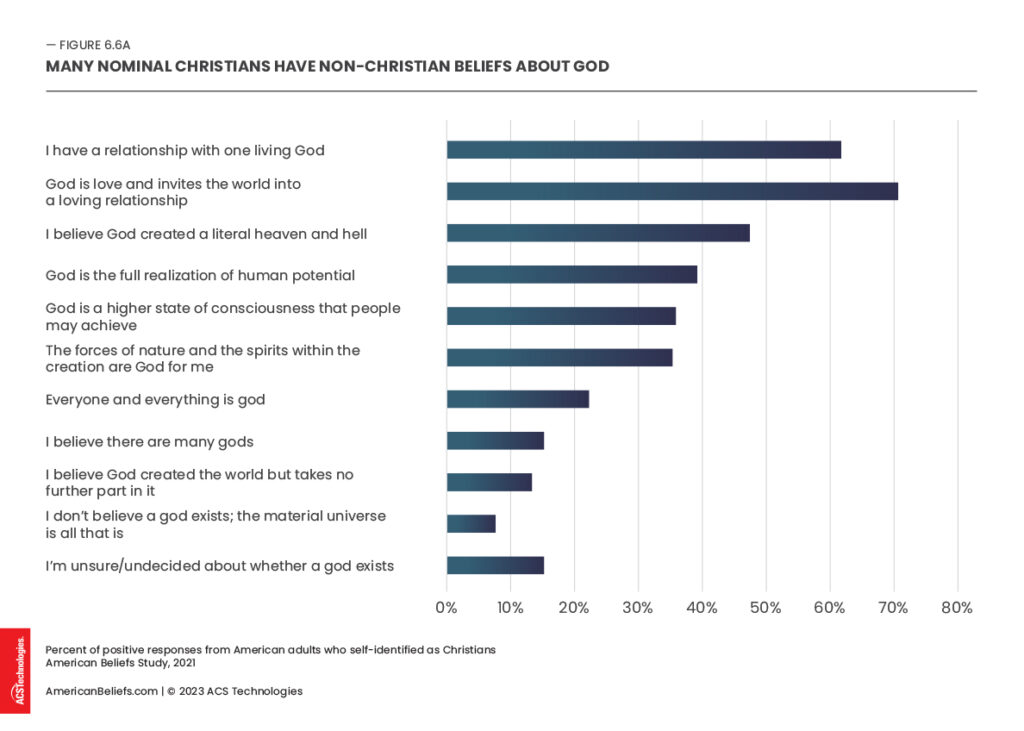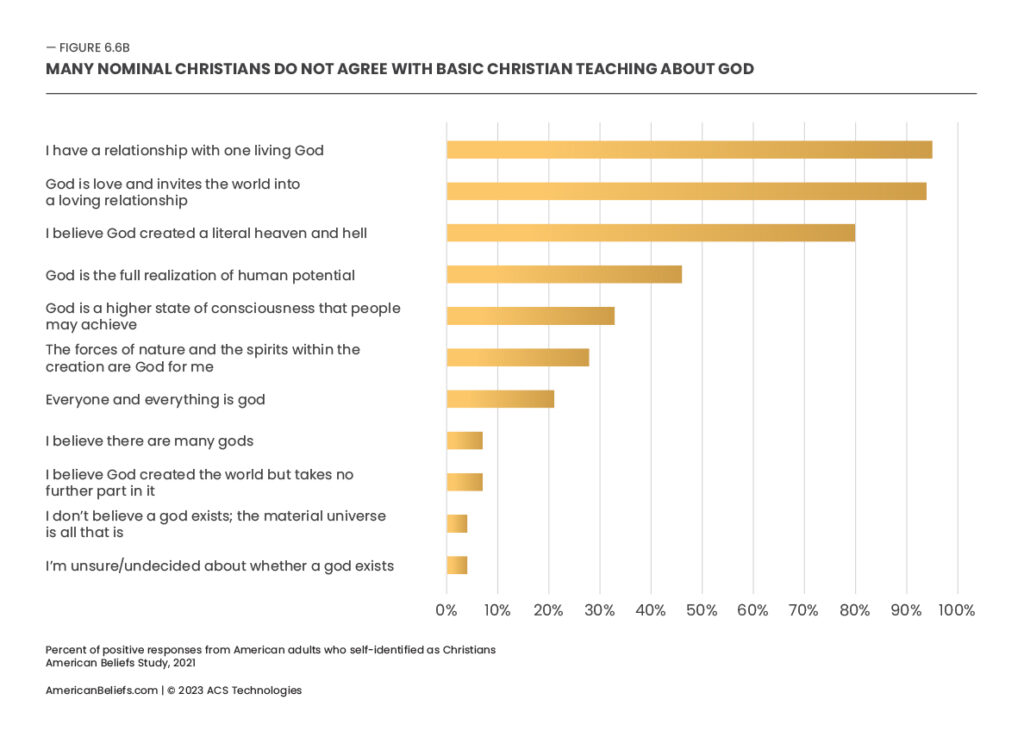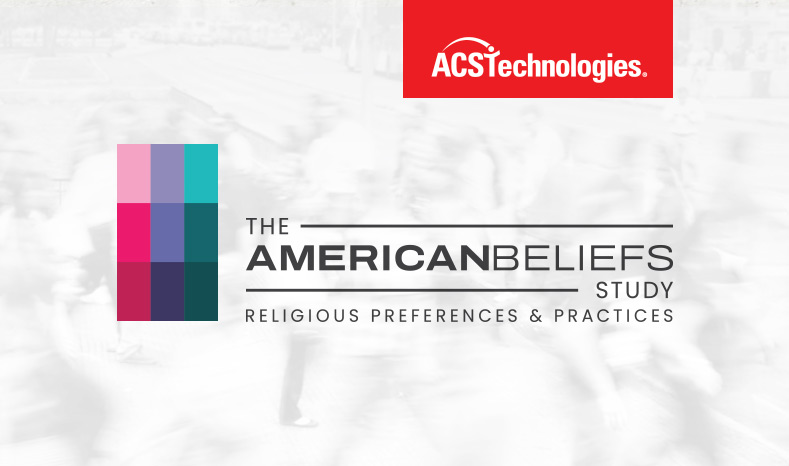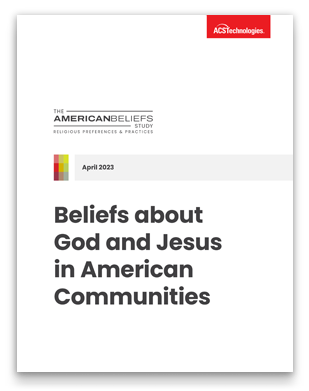“What is your religion?” There are a lot of people in America who, if you ask them that question they will answer, “I’m a Christian,” even though they don’t ever go to church, or maybe just a few times per year. Then there are the people who call themselves Christians but don’t consider their faith to be very important in their lives. Many of these Nominal Christians might say, “Yeah, I don’t go to church anymore … but I still believe in God!”
What Do Nominal Christians Believe About God?
The American Beliefs Study discovered something important about Nominal Christians. Whether or not they still believe in God is one thing. Who or what they believe God is, as it turns out, is quite another.
This Study asked a carefully-designed, representative sample of 15,000 Americans about their religious beliefs and behaviors. It found 6,332 respondents were Nominal Christians—defined as people who self-identify as Christian, attend a fellowship less than once per month, or say their faith has at most a “moderate” significance in their lives. The Study asked them whether they agreed or disagreed with a set of 11 statements about God.
Figure 6.6a shows the percentages that marked “Somewhat agree” or “Strongly agree.”

Some (7%) are atheists. It’s interesting that people would still identify themselves as Christians but agree with the statement, “I don’t believe a god exists.” More than twice that many are uncertain about the existence of God. 15% responded, “I’m unsure/undecided about whether a god exists.” For some Nominal Christians, if you said to them, “You should come back to church because that is where you meet God and draw closer to him,” they might not find that convincing. If they were honest, their response might be, “Get closer to God? I’m not sure there even is a God!”
The atheists plus those who are unsure, are a minority. More than seven in ten Nominal Christians (71%) still see God as real, as a God of love and believe he “invites the world into a loving relationship.” About two-thirds of them (63%) would say that have accepted that invitation and “have a relationship with one living God.”
Especially since the 1960s, ideas about God that come from Hinduism, Buddhism, Native American religion, and other non-Christian directions have entered the national discussion. The American Beliefs Study was able to measure the extent to which these non-Christian and non-Biblical ideas have affected people’s beliefs. Among the overall population, the Study discovered:
- 30-33% of Americans have a humanist concept of God.
- 31% of Americans have an animist concept of God.
- 20% of Americans have a pantheist concept of God.
- 15% of Americans have a polytheist concept of God.
In line with this national trend, many Nominal Christians also agree with these non-Biblical beliefs about God. Since they self-identify as Christians, one might think their concept of God would match what the Bible teaches, but in fact, for many of them, that is not the case. For Nominal Christians:
- 39% hold to a humanist concept of God, agreeing with “God is the full realization of human potential,” while 36% agree that, “God is a higher state of consciousness that people may achieve.”
- 35% believe in an animist concept of God, agreeing, “The forces of nature and the spirits within the creation are God for me.”
- 23% believe in a pantheist concept of God, agreeing, “Everyone and everything is god.”
- 15% believe in a polytheist concept of God, agreeing with, “There are many gods.”
The percentage of Nominal Christians who hold to a polytheist position matches the percentage in the national population. In other words, Nominal Christians believe there are many gods to the same extent that the general population does. Beyond that, consider the percentages of agreement noted above, for three other non-Christian concepts (humanism, animism, and pantheism).
Significant percentages of Nominal Christians believe in a god that is not the God of the Bible—to an even greater degree than the national population in general.
So when a Nominal Christian says, “I still believe in God,” it’s fair to ask, “Tell me about this God you believe in,” or, “What do you believe about God?” It’s a mistake to assume that because a person self-identifies as a Christian their concept of God fits with what the Bible teaches.
What Do Practicing Christians Believe about God?
The American population includes a lot of Practicing Christians. One might assume that their presence in the mix would pull the national, overall statistics on beliefs about God toward more orthodox, historic Christian beliefs. That might help explain why there is not more of a gap between what Nominal Christians believe vs. the national picture.
The American Beliefs Study found 21% of Americans are Practicing Christians, defined as people who identify as Christian, attend a faith fellowship at least once per month, and say their faith has “considerable” or “utmost” significance in their lives. The Study asked them whether they agreed or disagreed with the set of 11 statements about God.
Figure 6.6b shows the percentages that marked “Somewhat agree” or “Strongly agree.”

Among Practicing Christians there are a few atheists (4%) and a few who are unsure or undecided about the existence of God (also 4%). Seasons of doubt, or uncertainty, are not unusual among Christians. But to be a self-identified Christian, who attends church regularly, and who considers their faith to be very significant in their life, and then affirm, “I don’t believe a god exists” — that’s harder to fathom.
It’s no surprise that nearly all Practicing Christians (94%) believe “God is love,” and that he “invites the world into a loving relationship.” Nor is it surprising that they testify to having that relationship with him (95%). On a question of Christian theology, “God created a literal heaven and hell,” 80% of Practicing Christians agree, a marked difference from Nominal Christians, where only 47% agree.
One would expect that Practicing Christians would have a clear understanding of the Biblical idea of who God is, and would affirm it. But for many, that is not what the Study found.
Significant percentages of active, Practicing Christians hold to animist, pantheist, polytheist, deist, or humanist concepts of God.
This is one of the more surprising, even shocking, findings of the American Beliefs Study. For Practicing Christians:
- More than one-fourth (28%) say, “The forces of nature and the spirits within the creation are God for me,” an animist position.
- More than one in five (21%) believe, “Everyone and everything is god,” a pantheist statement.
- 7% agree with the polytheist position, “There are many gods.”
- Another 7% affirm the deist concept, that “God created the world but takes no further part in it.”
An understanding of who God is, is central to Christian faith. It is not a peripheral issue. In light of that, these are significant, alarming findings, especially about Practicing Christians, those who are more committed and more faithful to their churches.
Even larger percentages affirmed humanist concepts of God. The Bible teaches that God created the world and all of humanity. God existed before any people did, and would exist in glory if no humans had ever been created.
Christian teaching would affirm that people reach their full potential through knowing and obeying God, but would not define God in this way: “God is the full realization of human potential.” Christian teaching would affirm that people can gain greater understanding, wisdom, and spiritual insight through God and his Word, but would not define God in this way: “God is a higher state of consciousness that people may achieve.” These are statements related to a kind of humanism that is in clear disagreement with what the Bible teaches about the relationship between God and humanity.
Despite that, nearly half of Practicing Christians (46%) agree with the first humanist statement offered in the Study, and one-third (33%) agree with the second. Also this: by a gap of seven percentage points, more Practicing Christians than Nominal Christians believe, “God is the full realization of human potential.”
How did the American Christian community come to this? It’s one thing to accept that non-Christian concepts of God have infiltrated the culture at large. It’s another to see that non-Christian concepts of God have infiltrated the church, even among its more active and committed members. Somehow the teaching of basic Christian theology has been either neglected or ineffective.
Key Findings:
- Seven percent of Nominal Christians say they do not believe in God (or “a god”), and 15% say they are unsure or undecided about the existence of God.
- 80% of Practicing Christians believe “God created a literal heaven and hell.” Less than half of Nominal Christians agree.
- Between 39% and 23% of Nominal Christians believe in humanist, animist, or pantheist concepts of God. Another 15% believe “There are many gods.”
- Similarly, between 46% and 21% of Practicing Christians believe in humanist, animist, or pantheist concepts of God. Another 7% believe, “There are many gods.”
Ideas for Your Church:
- Teach basic Christian theology. Don’t just teach about how to live for God or how to be blessed by him. Teach about who he is.
- Especially with Nominal Christians, but also with those who are more faithful, don’t assume their ideas about God fit with historic Christian theology. Keep this in view as it might affect witness, discipleship, and preaching.
- Learn about Hindu, Buddhist, Animist, and other non-Christian theological concepts, how they differ from what the Bible teaches, how to explain the differences clearly, and how to defend the Christian position.
About this study
This online study among 14,942 American adults was conducted by Campbell Rinker for ACST from October 2020 through February 2021. Results were balanced by US region, 19 ‘Mosaic’ demographic clusters from Experian, and weighted by age to align with known population characteristics. The study carries a maximum margin of error of ±1.97% at the 95% confidence level within any US Census region. A comparative 2017 study involved the same size audience.
FREE REPORT
Provides Actionable Data on American Religious Life
In this report, you’ll discover:
- The activity level of Americans in local religious communities and how it has changed over the past decade.
- The most pressing concerns Americans face today, are concerns that will impact how you reach out to your community.
- Good news and bad news about the theological beliefs of Americans. And how they view places of worship in their community.
About the Authors
Dirk is president and CEO of Campbell Rinker, which has been a leading market researcher for nonprofits since the early 1990s. He has designed and implemented research projects for hundreds of ministries, charities, universities, and museums in the U.S. and internationally – helping clients understand and act on the attitudes, motivations and perceptions of their valuable constituencies.
Michael is a researcher, writer, and consultant to nonprofits. He and his wife were missionaries for 33 years, serving in Singapore, Virginia, Los Angeles, and England. Most of his ministry has been in global mission research. He has studied, and written on, growth trends among tens of thousands of Christian denominations, globally.





